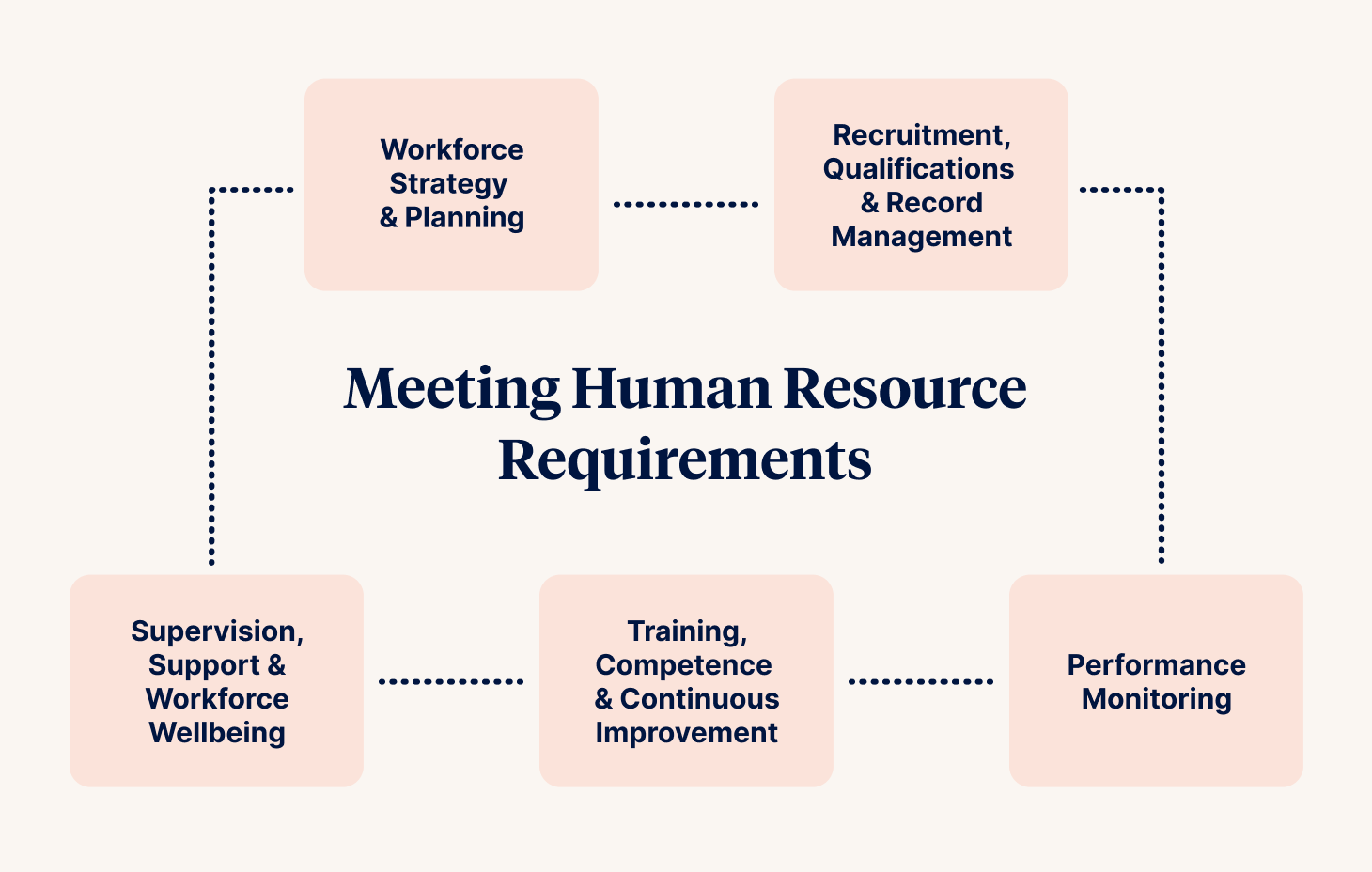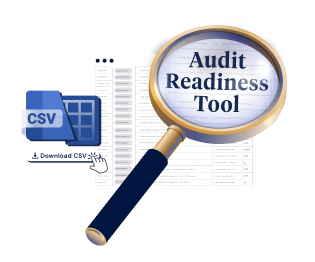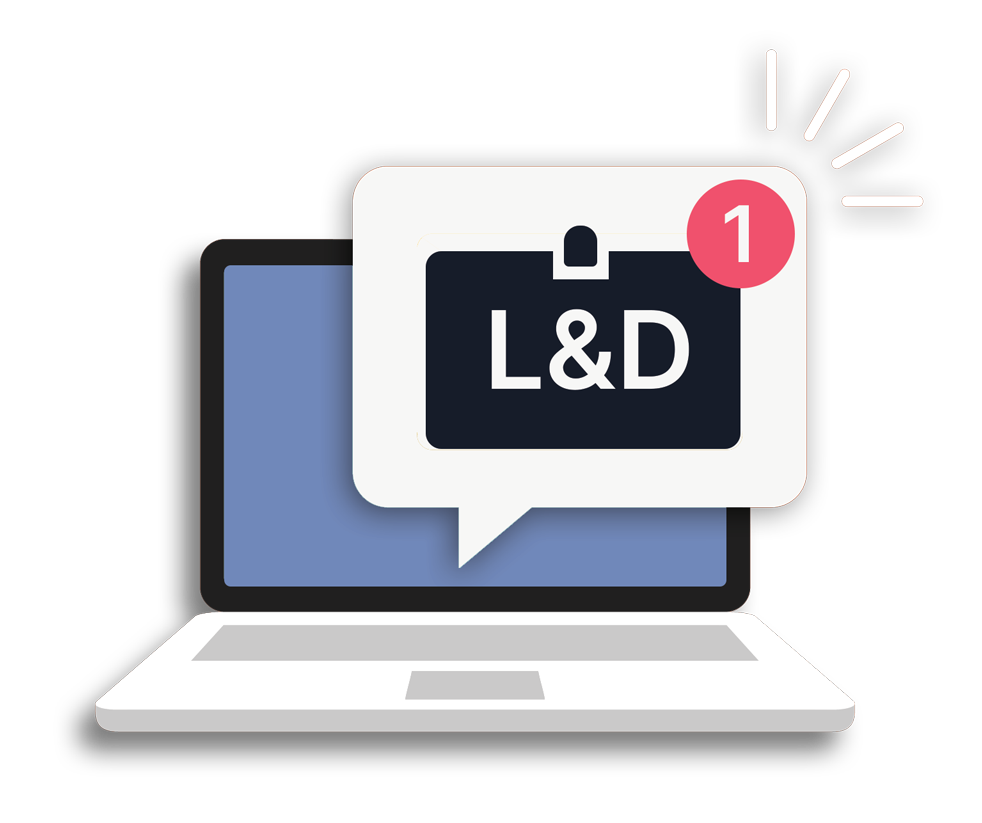A Foundation for Workforce Capability, Culture and Compliance
Effective human resource management is essential for building a skilled, competent, and supported workforce that can provide safe, high-quality care and services. A strong HR framework ensures that providers meet workforce planning and human resource management requirements under the strengthened Aged Care Quality and NSQHS Standards.
HR management goes beyond recruitment. HR underpins workforce capability, risk management, and quality systems, ensuring staff are equipped with the right skills, qualifications, and supervision to meet regulatory expectations and provide person-centred care.
Read our Training Requirement: Safety and Quality Training for a comprehensive guide on understanding and implementing safety and quality training actions, including how education supports workforce capability.
Using this Training Requirement
This Training Requirement provides guidance on understanding and implementing the workforce planning and human resource management actions outlined in the NSQHS Standards and Strengthened Aged Care Quality Standards.
While training and education are essential, building workforce capability relies on strong HR systems, governance, and processes. Where relevant, we will link to training modules and resources that support the implementation of best practices in human resource management.
Understanding the Relevant Actions in the Standards
NSQHS Standards:
Action 1.22 Performance Management
The health service organisation has valid and reliable performance review processes that:
- Require members of the workforce to regularly take part in a review of their performance.
- Identify needs for training and development in safety and quality.
- Incorporate information on training requirements into the organisation’s training system.
Understanding the Relevant Actions in the Standards
NSQHS Standards:
Action 1.22 Performance Management
- Require members of the workforce to regularly take part in a review of their performance.
- Identify needs for training and development in safety and quality.
- Incorporate information on training requirements into the organisation’s training system.
National Safety and Quality Health Service (NSQHS) Standards
Strengthened Aged Care Quality Standards:
The following actions are from Standard 2: The Organisation in the strengthened Aged Care Quality Standards. This Training Requirement focuses specifically on:
Outcome 2.8: Workforce Planning
Ensuring providers have a strategic approach to workforce planning, recruitment, and retention to maintain a skilled and stable workforce.
Actions in 2.8 Workforce Planning
| Action | Summary of Description |
|---|---|
| 2.8.1 | Develop a workforce strategy to track staffing needs, ensure minimum care requirements, recruit qualified workers, prioritise direct employment, and mitigate workforce shortages. |
| 2.8.2 | Implement strategies to support a satisfied and psychologically safe workforce. |
Outcome 2.9: Human Resource Management
Establishing systems to support staff competency, supervision, performance monitoring, and ongoing training to provide safe, high-quality care.
Relevant Actions in 2.9 Human Resource Management
| Action | Summary of Description |
|---|---|
| 2.9.1 | Maintain records of worker qualifications, experience, and pre-employment checks. |
| 2.9.2 | Ensure the right number and mix of staff for safe, quality care. |
| 2.9.3 | Provide supervision, support, and culturally appropriate resources. |
| 2.9.4 | Maintain an effective training system that ensures staff competency, incorporates individuals' experiences, and responds to feedback and risks. |
| 2.9.5 | Regularly review and improve the effectiveness of the training system. |
| 2.9.6 | Provide competency-based training on core matter |
| 2.9.7 | Conduct regular assessment, monitoring, and review of aged care workers' performance. |
Accountability for Human Resources
The successful implementation of workforce planning and human resource management requires clear accountability across all levels of an organisation.
Governing Body Accountability
The governing body is responsible for ensuring the organisation has a workforce strategy that meets the strengthened Aged Care Quality Standards requirements. This includes:
- Overseeing workforce planning to ensure there are sufficient qualified and competent staff.
- Monitoring workforce performance, training, and supervision.
- Ensuring compliance with minimum care requirements and legislative obligations.
Operational Accountability
The executive and management teams are responsible for workforce planning and HR systems by:
- Implementing and maintaining workforce strategies to support staff capability, retention, and wellbeing.
- Ensuring training systems are in place and regularly reviewed.
- Providing supervision, escalation pathways, and support resources for staff.
- Mitigating risks related to staff shortages and vacancies.
Workforce Roles and Responsibilities
All aged care workers are responsible for:
- Maintaining their qualifications and competencies relevant to their roles.
- Participating in supervision, training, and performance reviews.
- Providing feedback to improve workforce systems, training effectiveness, and overall workplace culture.
Meeting Human Resource Requirements
Meeting workforce planning and human resource management requirements requires a structured, strategic approach. Organisations must move beyond thinking about just minimum compliance to actively build workforce capability, support staff wellbeing, and ensure continuous improvement.
The following key areas outline how organisations can broadly think about meeting these standards:
- Workforce Strategy and Planning
- Recruitment, Qualifications, and Record Management
- Supervision, Support and Workforce Wellbeing
- Training, Competence, and Continuous Improvement
- Performance Monitoring

| Key Area | Meeting the Requirements |
|---|---|
| Workforce Strategy and Planning |
|
| Recruitment, Qualifications, and Record Management |
|
| Supervision, Support, and Workforce Wellbeing |
|
| Training, Competence, and Continuous Improvement |
|
| Performance Monitoring |
|
Evidence of Compliance
Organisations can demonstrate compliance with workforce planning and human resource management requirements by maintaining clear documentation, structured processes, and governance oversight.
Refer to detailed lists of evidence that may be audited by viewing:
- Strengthened Aged Care Quality Standards Evidence Mapping Framework (the auditor's tool)
- NSQHS Standards Action 1.22 Examples of evidence

Ensure your organisation is prepared for your first audit under the strengthened Standards.
High-Priority Items
The following high-priority evidence items are commonly requested to assess compliance with workforce strategy, staff qualifications, supervision, training, and performance management.
| Evidence Area | Examples |
|---|---|
| Workforce Strategy and Planning | Workforce strategy detailing staff mix, recruitment, and retention approaches. |
| Risk mitigation strategies for workforce shortages and staffing gaps. | |
| Master roster and shift records, including unfilled shifts. | |
| Plans for continuous improvement in workforce planning. | |
| Recruitment, Qualifications, and Record Management | Pre-employment records (background checks, qualification verification, experience records). |
| Policies and processes for tracking worker qualifications, competencies, and training. | |
| Sample position descriptions for clinical and non-clinical roles. | |
| Agency and subcontractor agreements detailing qualification and competency expectations. | |
| Worker files showing up-to-date employment records. | |
| Supervision, Support, and Workforce Wellbeing | Policies and procedures for supervision and escalation pathways. |
| Evidence of culturally appropriate support resources, particularly for staff with English as a second language. | |
| Survey results or feedback reports demonstrating staff satisfaction and workplace safety (physical and psychological). | |
| Meeting minutes showing governance oversight of workforce wellbeing initiatives. | |
| Training, Competence, and Continuous Improvement | Training policies and procedures detailing core, non-core and competency-based training requirements. |
| Training system records, including training needs analysis, training matrix and competency assessments. | |
| Performance review documentation, linking training to staff development. | |
| A process demonstrates how a review of the training system's effectiveness led to improvements based on feedback and incidents. | |
| Performance Monitoring and Compliance | Performance review policies and documented development systems aligned with professional guidelines. |
| Audit results on staff competency, training completion rates, and workforce performance. | |
| Mentoring and peer review reports supporting professional development. | |
| Meeting minutes where workforce performance, credentialing, and training are reviewed. | |
| Feedback from the workforce on training effectiveness and ongoing development needs. |
Effective workforce planning and human resource management are essential for not just compliance but building workforce capability and a stable, supported workforce that provides high-quality care.
Organisations can meet regulatory requirements by implementing strong governance, structured training, and performance monitoring while building a resilient, well-supported workforce.
Relevant Resources
Explore our Guide to Ausmed’s Audit Readiness Tool for a structured approach to meeting evidence requirements.
Watch our webinar, Getting Your Training System Ready for an Audit, for a detailed look at how training, learning, and development requirements align with audit expectations.
- Strengthened Aged Care Quality Standards - Aged Care Quality and Safety Commission
- Strengthened Quality Standards Provider Guidance - Aged Care Quality and Safety Commission
- Evidence Mapping Framework - Aged Care Quality and Safety Commission
Author
Zoe Youl
Zoe Youl is a Critical Care Registered Nurse with over ten years of experience at Ausmed, currently as Head of Community. With expertise in critical care nursing, clinical governance, education and nursing professional development, she has built an in-depth understanding of the educational and regulatory needs of the Australian healthcare sector.
As the Accredited Provider Program Director (AP-PD) of the Ausmed Education Learning Centre, she maintains and applies accreditation frameworks in software and education. In 2024, Zoe led the Ausmed Education Learning Centre to achieve Accreditation with Distinction for the fourth consecutive cycle with the American Nurses Credentialing Center’s (ANCC) Commission on Accreditation. The AELC is the only Australian provider of nursing continuing professional development to receive this prestigious recognition.
Zoe holds a Master's in Nursing Management and Leadership, and her professional interests focus on evaluating the translation of continuing professional development into practice to improve learner and healthcare consumer outcomes. From 2019-2022, Zoe provided an international perspective to the workgroup established to publish the fourth edition of Nursing Professional Development Scope & Standards of Practice. Zoe was invited to be a peer reviewer for the 6th edition of the Core Curriculum for Nursing Professional Development.



